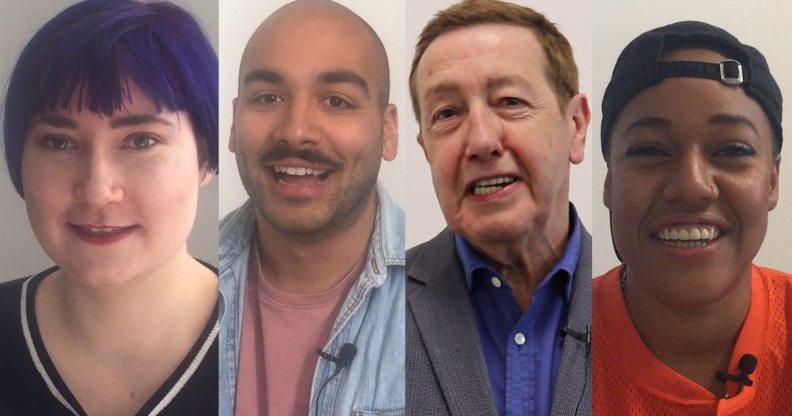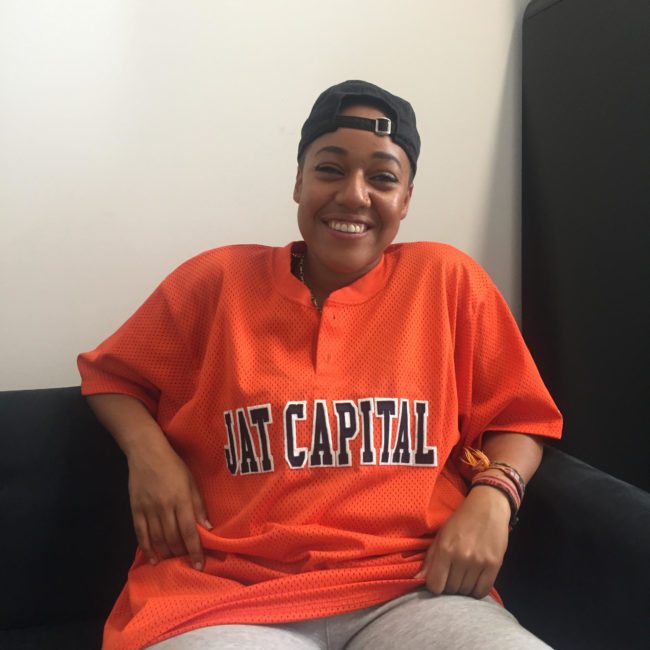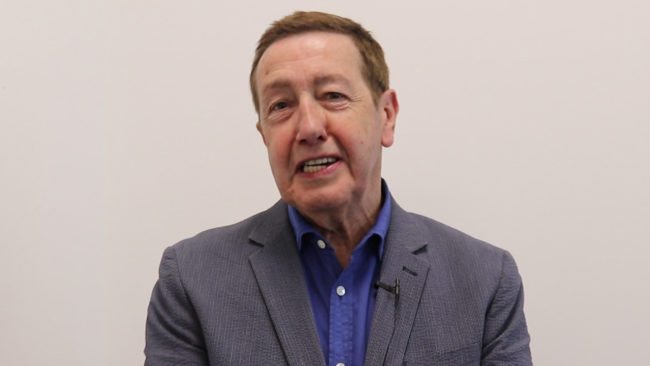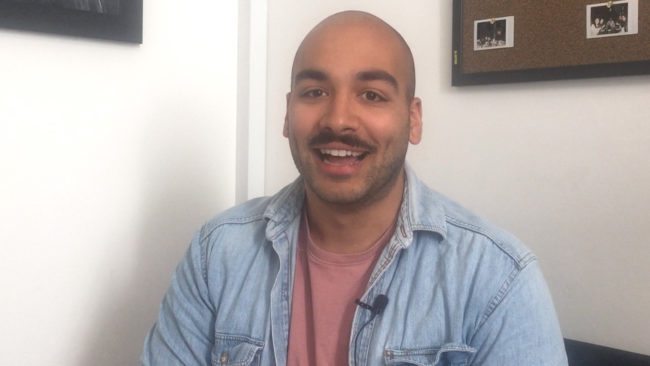Mental Health Awareness Week: Queer activists breaking the stigma

As Mental Health Awareness Week kicks off, PinkNews has sat down with queer activists who are encouraging people to break the stigma surrounding mental health.
Alexander Leon, Ellen Jones, Tanya Compas and Ben Thomas spoke to PinkNews about how race, disability and age can impact your mental health, and they give their advice to anyone LGBTQ who may be struggling.
Tanya Compas is an “unapologetic” queer Black woman who speaks openly about mental health as a youth worker, and points out the whiteness of discussion around mental health.
“People don’t really speak about it, and when you look at mental health and the way it’s portrayed in the media, there’s generally quite a white face to it as well,” she told PinkNews.
“You don’t get many queer Black people speaking about their mental health openly.
“It’s only through representation and hearing people speak about their mental health more that other people realise it is okay to go for counselling, or seek help.
“Being LGBTQ has definitely affected my mental health – in both positive and negative ways.”
Before coming out at the age of 24, Tanya struggled with feeling like she was “living a double life.”
Coming out, however, isn’t where struggles stop but can actually arise, Tanya found.
“When you do actually come out and people don’t get it or people don’t accept you for it, then you start questioning your whole entire identity.

Youth worker Tanya Compas (PinkNews)
“I thought to myself ‘if they can’t accept me for who I am, then what’s the point of me being here?’ Because I can’t change it.
“You feel really lost and you don’t know where to seek help or what to do.
“But now I’ve had these conversations with my family and friends, who do now accept, being queer and understand my sexuality has been the best thing that’s happened to me.
“The queer, trans and intersex poc community is just so important – I’ve found people who do just get it and it’s such a beautiful thing.”
Her advice to anyone who is struggling with their mental health or find it hard to navigate their LGBTQ identity is to “try and find community” at events like UK Black Pride.

(Facebook/UK Black Pride)
Related: UK Black Pride exec Phyll Opoku-Gyimah confirms plan to run for Parliament
“Just because you now find yourself as part of a minority, doesn’t mean you should accept any less or being around people who don’t uplift you,” she explained.
“Don’t accept any less – it is hard because it requires a lot of self-reflecting about who you’re spending your time with and if you’re living your best life.
“You know yourself better than anyone so it’s just a case of allowing yourself to explore that identity.”
As an older gay man, Ben Thomas is a professor of mental health and volunteers as an ambassador for Opening Doors London – a charity seeking to prevent isolation among older LGBTQ people.
When he realised he might be gay, Ben considered ‘gay conversion’ therapy.

Ben Thomas (PinkNews)
“I didn’t particularly want to be gay and I read about how people could have some sort of conversion therapy and I thought about doing that,” Ben told PinkNews.
Fortunately, he read more, confided in a friend who came out to him, and he changed his mind.
Now, Ben advocates for older LGBTQ people and the loneliness that his community often faces while dealing with issues such as dementia, having to go back into the closet in care homes, and losing a partner.
“Last year I had to go into hospital for a procedure.
“The nurse asked me for my address and she said, ‘Your next of kin, your wife, does she live with you?’
“I told her, ‘Well no actually, I’m gay and I live with my partner.’
“I could see her face change and she actually took a step back, and the rest of her interaction with me was strained.
“So this stuff still crops up now.”
Related: Government-funded report calls care for LGBT people with dementia a ‘woeful failure’
Ben points out that older LGBTQ people may be more likely to feel alienated from “a very young, vibrant, club-focused community” – particularly as they have grown up with Section 28, may not have children or have lost a partner later in life.
“People say to me that as they become older, they feel that they become invisible,” he explained.
His advice to older LGBTQ people is to get involved with activities at Opening Doors London as a way of meeting new friends and having the opportunity to chat about mental health.
Alexander Leon is a proud mental health advocate, and also volunteers as a Diversity Role Model in his spare time, going into schools to speak as a LGBT role model.

Alexander Leon (PinkNews)
Coming to terms with being gay – he contemplated suicide at age 19 – and is now determined to encourage others to not feel ashamed of their struggles.
“Being LGBT and a person of colour, one of the things that always struck me was that I didn’t have many role models,” he told PinkNews.
“Being on the intersection of being a person of colour and being queer, you’ve got two competing identities which both affect your ability to maintain a buoyant and resilient sense if self-esteem.
“When you’re a queer person growing up and trying to figure out who you are, we’re all so caught up in being in the closet and coming out.
“So often when you get out of the closet, we’re like ‘great, done, wash your hands’ but actually in becoming the best version of yourself, you have to acknowledge your struggles.
“I think more of us than we would like to admit still struggle with coming to terms with who were are – people think you come out and things are just going to be dandy and that’s just not that case.
“You’re constantly coming out for the rest of your life.”
He adds that part of self-care and breaking down stigma can come into play at work, and might be a conversation with your boss about needing time out.
“It can be a really uncomfortable conversation and it won’t always go your way, but even if you’re just chipping away at the enormous boulder, which is the culture of never talking about mental health, it will help.”
Alexander says he has found the struggle to be open about mental health – a stigmatised, often misunderstood issue – is similar to being openly LGBT.
“The first time I come out I found it so difficult to say the word gay in reference to myself – I was shaking, I was terrified,” he explained.
“To this day, sometimes when I talk about my depression it can be uncomfortable but it becomes easier and easier.
“Sometimes people you reach out to don’t know how to help you – they might not understand gender or sexual identity.
“They might not get it but you’ve said it out loud and the more you talk about it, the less lonely it’ll get.
“I have people writing to me on Twitter saying I’ve never seen someone who is like me, and it is so empowering and it’s the reason I do it.”
At just 19, Ellen Jones has already been named Young Campaigner of the Year by Stonewall, been elected disability rep at university, and set up a flourishing YouTube channel where she speaks openly about being autistic and having bipolar disorder.
“The more you talk about mental health, the less stigmatised it’s going to become,” she explained.

Ellen Jones (PinkNews)
Ellen came out at the age of 14, and as “the only lesbian in an all-girls school,” she not only felt isolated but also experienced cyberbullying from her peers.
“The reason I experienced poor mental health from the outset was because of homophobic bullying.
“I started getting death threats, people online telling me to kill myself, starve myself, from people who knew what lessons I’d had that day or who I’d seen.
“There was an assumption that I was okay but I experienced bad mental health for about five years before I got diagnosed.”
Ellen was diagnosed with autism at the same time as bipolar – she said she’s lucky to have found out so young, particularly as women are under-diagnosed.
“It’s massively under-diagnosed among women, people who aren’t white, people who aren’t cisgender,” she explained.
“Autism isn’t a mental illness in itself but it’s a neurodivergence and it does interact with the way you think.”
Ellen’s biggest frustration, she says, is that organisations and services are too often focused on helping with just one part of your mental health, rather than looking at your identity as a whole.
“They’re not making the connections, or looking at each thing and how they interact with each other.
“Then you’ve got people like me, who can’t access services because there’s nothing that caters for our different needs.”
Her advice for other young queer people is to talk openly about their mental health but also remember that your mental health “is not the sum of you.”
“It can feel restrictive but I have bipolar, it’s not all of me,” she said.
If you need advice or support, you can contact these UK services below:
LGBT Switchboard provide support over the phone, messaging or email
Galop provide support with hate crime, sexual violence and domestic abuse
Opening Doors London supports older LGBTQ people

